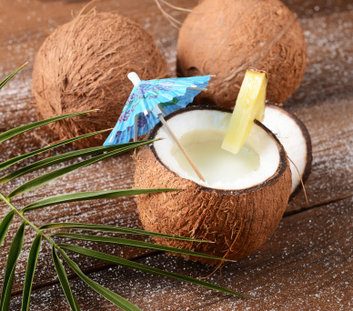The health benefits of coconut
Whether in the form of a hydrating beverage, a healthy oil or flavourful flakes, coconut is more popular than ever. Here’s how it boosts your health

Source: Best Health magazine; March/April 2014; Image: Thinkstock
Everything old is definitely new again. Coconut is exploding as a food trend for 2014, yet it has a long history. Its scientific name is cocos nucifera; according to the U.S.- based Coconut Research Center, early Spanish explorers to tropical countries called it ‘coco,’ which means ‘monkey face’ (because of its colour and fibrous outer shell, which resembles hair). Nucifera means ‘nut bearing.’ Nearly one third of the world’s population depends on the coconut to some degree for their food and economy; indeed, in some cultures the coconut palm is so highly valued that it’s called ‘The Tree of Life.’
Is it truly healthy?
Not surprisingly, coconuts are on the ‘do eat’ list of foods for anyone on the Paleo Diet’after all,that diet is based in large part on the foods of our pre-agricultural, hunter-gatherer ancestors. But besides its history, what else does a coconut have going for it? For one thing, the meat is rich in vitamin C. And it contains a decent amount of potassium: One cup of shredded coco- nut has 285 milligrams. But what about the fat content? That same cup of coconut has 283 calories and 27 grams of fat’24 of which are saturated. That’s a bad thing, right?
This saturated fat is good
According to 21-Day Tummy, a new book published by Reader’s Digest that features a diet to beat belly fat and aid digestion, coconuts contain two nutrients of particular interest: medium-chain triglycerides and lauric acid. Most fats are long-chain fats, which take longer for your body to break down and digest. But most of the fats in coconuts are medium-chain triglycerides, which are more easily digested and so less likely to get stored as fat. As for lauric acid, it has antibacterial effects. Coconut oil is rich in lauric acid; try cooking with it occasionally.
What about coconut milk?
Say the authors of 21-Day Tummy, if you need a lactose-free substitute for milk, coconut milk is a great one. It provides an excellent mix of fat, vitamin E and other nutrients. It can help stabilize blood sugar and combat inflammation. At the grocery store, look for low-fat or light versions with no added sugar.
Curious about how coconut milk is made? It’s a mixture of coconut juice (the watery liquid found in young coconuts) pressed with coconut meat.
This article originally appeared in the March/April 2014 issue of Best Health. Subscribe today to get the full Best Health experience’and never miss an issue!




